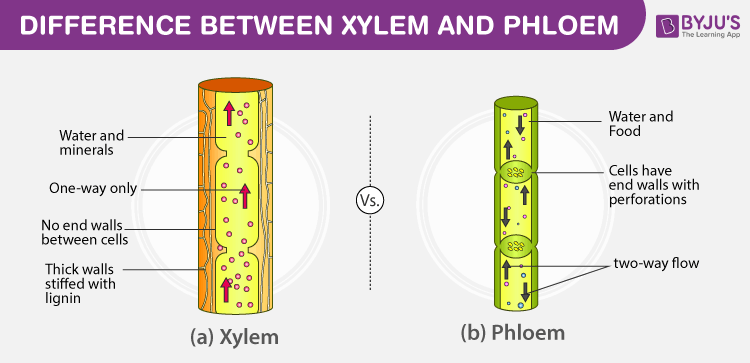Plants are classified based on many criteria and one such classification is the presence or absence of a vascular system. Essentially, a vascular plant has specialized features that help it to absorb water and minerals from the soil. These include special tissues such as xylem and phloem.
Xylem and Phloem
Xylem and Phloem are two different types of vascular tissues, which are mainly involved in the transportation process. These tissues form a vascular bundle and these work together as a unit. The movement of xylem is unidirectional, while the movement of phloem is bidirectional.
Let us explore the major differences between xylem and phloem in detail.
Also Read: Transportation in Plants
Differences Between Xylem and Phloem

Difference between Xylem and Phloem
Following are the important differences between xylem and phloem:
| Xylem | Phloem |
| Definition | |
| Xylem tissues are the tubular-shaped structure, with the absence of cross walls. This tissue resembles the shape of a star. | Phloem tissues are tubular-shaped, elongated, structures with the presence of walls with thin sieve tubes. |
| Location | |
| It is located in the centre of the vascular bundle. | It is located on the outer side of the vascular bundle. |
| Fibres | |
| Xylem fibres are smaller. | Phloem fibres are larger. |
| Found In | |
| They are present in roots, stems and leaves. | They are present in stems and leaves, which later transports and grow in roots, fruits and seeds. |
| Movements | |
| These tissues move in a Unidirectional. (only in one direction – upward direction) | These tissues move in a Bidirectional. (both ways – up and down) |
| Comprises | |
| They live with hollow dead cells. | They live with cytoplasm without the nucleus. |
| No of Tissues | |
| The total amount of xylem tissue is more. | The total amount of phloem tissue is less. |
| Features | |
| It consists of tracheids, vessel elements, xylem parenchyma, xylem sclerenchyma and xylem fibres. | It consists of four elements: companion cells, sieve tubes, bast fibres, phloem fibres, intermediary cells and the phloem parenchyma. |
| Functions | |
| Transports soluble mineral nutrients and water molecules from the roots to the aerial parts of the plant. | Transports food and other nutrients including sugar and amino acids from leaves to storage organs and growing parts of the plant. |
| Vascular Bundles | |
| Forms vascular bundles with phloem. | Forms vascular bundles with xylem. |
| Functions | |
| Provides mechanical strength to the plant and helps in strengthening the stem. | Translocates the synthesized sugars by the photosynthetic areas of plants to storage organs like roots, bulbs and tubers. |
| Functions | |
| It is responsible for replacing the total amount of lost water molecules through transpiration and photosynthesis. | It is responsible for transporting proteins and mRNAs throughout the plant. |
Xylem Tissues
Xylem is one of the important tissues of the vascular system of plants. The main activity of this tissue is to transport minerals and water from roots and carry them to other parts of the plants. It has two separate chambers, tracheids and vessels for transporting minerals and water. The term xylem is derived from the Greek word – ξύλον (xylon), meaning wood.
Phloem Tissues
Phloem is also important as the xylem tissues for the vascular system of plants. The main activity of this tissue is to transport nutrients and food from leaves to other growing parts of plants. The term phloem is derived from the Greek word – φλοιός (phloios), meaning bark.
Also Read: Transpiration Pull
For more information on xylem and phloem and the differences between them, keep visiting BYJU’S website or download the BYJU’S app, for further reference.

Frequently Asked Questions
Where are the xylem and phloem located?
The xylem is located towards the adaxial surface of the leaf, whereas, phloem is located towards the abaxial surface of the leaf.
What are the functions of xylem and phloem?
Xylem and phloem facilitate the transportation of water, minerals and food throughout the plant. Xylem carries water and minerals from the roots to the leaves. Whereas, phloem carries the food prepared by the leaves to different parts of the plant.
Are xylem cells dead?
Xylem cells are made up of a long chain of dead cells known as vessel elements. The vessel elements have no organelles. The components of xylem tissues are highly lignified and scalarified. Hence, xylem cells are considered dead.
Why are the phloem cells alive?
The cells that make up the phloem tissues need to be alive to facilitate the active transport of sucrose throughout the plant.

The differences are very useful 😊
Nice differentiation between xylem and phloem. Nice explanation
Thanks Byju’s . It helped me a lot
nice app
Nice aap
loving this app😚😚😚
The difference was accurate
thanks for this app
Nice app for learning
So good app and teachers
Nice app
I like it😀😀😀
The differences are useful
These differences between the xylem and phloem cells have cleared my doubts in this topic
Thank you very much ☺️
I love this app🏆🏆🏅🏅
Thanks a lot for these differences, It is very useful
Thanks,
Dear teacher I was searching for the same Information
Nice explanation
very good
very very useful . Byjus i sreally wonderful